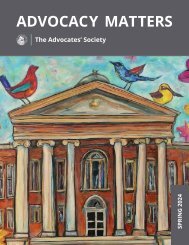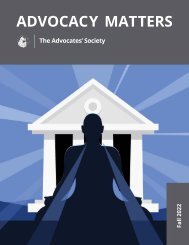Advocacy-Matters-Winter-2024
Keep up to date on what your fellow Society members have to say in Advocacy Matters.
Keep up to date on what your fellow Society members have to say in Advocacy Matters.
Create successful ePaper yourself
Turn your PDF publications into a flip-book with our unique Google optimized e-Paper software.
What advice would you give to other foreign-trained lawyers who are<br />
considering pursuing a legal career in Canada? Are there particular steps<br />
or resources that were especially helpful to you?<br />
OO: Revisit the process of accepting articling students. There are obstacles to finding articling positions<br />
for internationally-trained lawyers, many of whom are already practicing lawyers with life demands and<br />
other familial and financial pressures. Law firms need to recognize and utilize the special and diverse<br />
skills and views that internationally-trained lawyers bring by virtue of their previous experiences.<br />
MK: (1) Canadian lawyers may be more prepared than you might expect to give up their time and speak<br />
with you; (2) connect with the organization set up for Internationally Trained Lawyers and National Committee<br />
on Accreditation lawyers to learn about the fundamentals of, and opportunities for, local legal<br />
recruitment.<br />
CC: Get involved. Getting involved in a local legal organization is a great way to build your network and<br />
connect with other advocates. The Advocates’ Society is an incredible resource — for those within their<br />
first 10 years of practice, I would encourage them to apply for a spot on the Society’s Young Advocates’<br />
Standing Committee (YASC) when applications open up in late January. In the meantime, get out to<br />
YASC events and consider joining YASC’s volunteer roster (details are all at advocates.ca).<br />
OO: Seek out people with similar experiences for their knowledge, BUT don’t make associating with only<br />
people of similar background or experience your main or only goal. You hopefully came to Canada for<br />
its diversity. Find and approach mentors, lawyers and businesspeople alike.<br />
VM: There are some groups, like the NCA Network, that have started to build communities for foreign-trained<br />
lawyers, but my impression is that many foreign-trained lawyers end up working as law<br />
clerks – if they can get into the legal job market – or are resigned to work in other completely unrelated<br />
fields. There needs to be leadership from the top of the profession to educate themselves about the relative<br />
strengths of lawyers trained in other jurisdictions so that there is less stigma attached to credentials<br />
from other countries – especially non-Western countries.<br />
Most people bring their cultural competencies to the workplace, along<br />
with attendant biases and misconceptions. I used to think if you didn’t<br />
address them, your life would be easier. I don’t necessarily challenge; I<br />
educate.<br />
22<br />
VM: I think that the most important thing that any foreign-trained lawyer can do is to manage their expectations<br />
and to take care of themselves – it will likely take longer than you are expecting and there will<br />
be many times when you feel discouraged, but it only takes one person saying yes.<br />
In what ways can the legal community better support foreign-trained<br />
lawyers in their career journeys?<br />
CC: Give them an opportunity. While it’s easy to bring in those candidates for interviews whose transcripts<br />
you understand, whose previous employers you recognize, and who volunteer for the same organizations<br />
you do, take a chance on someone that might not be the typical candidate on paper and grant<br />
them an interview. You may find that the grit and determination they bring to the table outweighs the<br />
fact that they went to school outside Canada.<br />
MK: The legal community should recognize in their own self-interest (just as engineers, accountants, etc.<br />
have done) that there is a vast pool of generally untapped talent overseas.<br />
Looking ahead, what do you envision for the future of foreign-trained<br />
lawyers in the Canadian legal landscape, and what steps can be taken to<br />
further integrate and empower this diverse group within the profession?<br />
VM: My hope is that lawyers trained in any country will feel that they can succeed in Canada and that<br />
there will be lawyers in law firm leadership positions and in positions of authority who are not originally<br />
from Canada and who did not earn their law degree in Canada. In terms of empowering foreign-trained<br />
lawyers – as with any group, I think seeing people succeed in the profession who have a similar background<br />
as you will go a long way to opening people’s minds to what’s possible, and I think that it’s important<br />
for groups who are in a position to help foreign-trained lawyers – like The Advocates’ Society and<br />
other legal associations– to start actively identifying and planning programs for foreign-trained lawyers<br />
so that they feel supported by the profession.<br />
OO: I think the legal profession is evolving and hopefully will only get better at absorbing this relatively<br />
untapped well of lawyers. Involving internationally-trained lawyers in legal and management work at<br />
their actual level of experience – as opposed to the assumption that every articling student should be<br />
treated as equally junior – would be beneficial to both internationally-trained lawyers and to the law<br />
firms that employ them.<br />
23

















